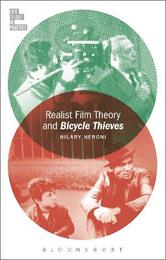
|
Realist Film Theory and Bicycle Thieves
Paperback / softback
Main Details
| Title |
Realist Film Theory and Bicycle Thieves
|
| Authors and Contributors |
By (author) Hilary Neroni
|
| Series | Film Theory in Practice |
|---|
| Physical Properties |
| Format:Paperback / softback | | Pages:184 | | Dimensions(mm): Height 197,Width 127 |
|
| Category/Genre | Film theory and criticism
Popular philosophy |
|---|
| ISBN/Barcode |
9781501378591
|
| Classifications | Dewey:791.43612 |
|---|
| Audience | | Tertiary Education (US: College) | |
|---|
|
Publishing Details |
| Publisher |
Bloomsbury Publishing Plc
|
| Imprint |
Bloomsbury Academic USA
|
| NZ Release Date |
10 August 2023 |
| Publication Country |
United States
|
Description
The Film Theory in Practice series fills a gaping hole in the world of film theory. By marrying the explanation of a film theory with the interpretation of a film, the volumes provide discrete examples of how film theory can serve as the basis for textual analysis. Realist Film Theory and Bicycle Thieves offers a concise introduction to realist film theory in jargon-free language and shows how this theory can be deployed to interpret Vittorio De Sica's 1948 Italian neo realist masterpiece Bicycle Thieves. Hilary Neroni explores the original realist film theorists from the 1940s: Andre Bazin, Siegfried Kracauer, and Cesare Zavattini, among others. But rather than seeing realist film theory as simply a theory of the past to be moved beyond, the book argues that the prevalence of realism in many different forms within practice and theory suggests the importance of updating this original realist film theory with an understanding of realism that would sustain its viability. Throughout the book, Neroni analyzes neorealist film movements-such as Italian Neorealism, Parallel Cinema of India, and the Iranian New Wave-that challenge mainstream realism with a more radical form that exposes the social order instead of hiding it. Her in-depth investigation of Bicycle Thieves provides a realist methodology that reveals the radicality of its combination of realist techniques, a melodramatic story, and humanist values.
Author Biography
Hilary Neroni is Professor of Film and Television Studies at the University of Vermont, USA. She is the author of Feminist Film Theory and Cleo from 5 to 7 (Bloomsbury, 2016), The Subject of Torture (2015), and The Violent Woman (2005) and has also published numerous essays on film and theory.
ReviewsNeroni's Realist Film Theory and Bicycle Thieves brilliantly distils the conceptual moves and political stakes of Neorealism, while making an original and compelling case for the contemporary revitalization of realist film theory. By emphasizing realism's dependence on mediation, Neroni eloquently argues for the radical power of the realist form to reveal the ways in which our reality is structured. Her novel reading of Bicycle Thieves powerfully demonstrates how filmic realism's vital relationship to melodrama enables viewers to forge new relationships to the social order. * Jennifer Friedlander, Edgar E. and Elizabeth S. Pankey Professor of Media Studies, Pomona College, USA, and author of Real Deceptions: The Contemporary Reinvention of Realism (2017) * Grounded in traditional theorists of realism such as Bazin and Kracauer, Neroni's book takes a welcome and unexpected turn, adroitly charting the rise of a postwar Italian neorealism in which melodrama (of all genres!) was deployed to impugn the ideological structures through which individuals understood and experienced the world around them. Neroni's indispensable close reading of Bicycle Thieves combines history, theory, and semiotic analysis to make clear how neorealist figures such as De Sica, Zavattini, and Visconti weaponized melodrama to expose and ultimately fracture the mediation of the social order, inspiring generations of filmmakers to follow. * Hugh S. Manon, Associate Professor of Screen Studies, Clark University, USA * Hilary Neroni's new book is a refreshing and original reevaluation of reality, realism, and realist cinema with a range and scope that is both exhilarating and expansive. Lucidly written and theoretically rigorous-a significant accomplishment in itself-the book offers readers the history of realist theory in film as well as contemporary engagements with realism in global cinema. A must read for both beginner and advanced students and scholars of cinema. * Gautam Basu Thakur, Associate Professor and Director of Critical Theory, Boise State University, USA *
|